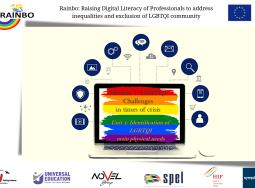Dutch government declares the end of the COVID-19 epidemic

March 2, 2023 - The Dutch COVID-19 outbreak team has declared an end to the COVID-19 epidemic. Previous research has shown how LGBTIQ+ people have been more affected by COVID-19 than the average population. GALE was involved in an international project to help provider mediate these unequal impacts. Now we face the question if we can sustain what we have learned during the epidemic. Are we returning to the “normal” (exclusion), or did we learn how to turn new ways to our advantage?
End of the epidemic
On Monday, the Dutch COVID-19 outbreak team advised the government to not start a new (fifth) round of vaccinations. It also advised to abolish the testing centers and to cease the formal advice to self-test when you have complaints. The outbreak team expects that new variants of the virus will be mild and that most people will have built up such a immunity that they will not suffer severe consequences when they get infected. It is expected the government will follow this advice. It follows a global trend. In the end of January, the USA announced to end all measures in May. There is little attention for the after-effects of the epidemic, except reparation payments for some of the people who got long-COVID.
How LGBTIQ+ people have been more affected
Especially more vulnerable LGBTIQ+ have been more severely affected. LGBTIQ+ younger and older people and lesbians have been more lonely and suffered more from depression, HIV+ and transgender people were confronted with less access to medication and care, and gay men had difficulty accessing PREP and HIV/STD testing services. All LGBTIQ+ people globally were confronted with more discrimination and violence because of the mix of general anxiety, looking for scapegoats and because of the already ongoing right-wing polarization. Although such impacts were relatively mild in the Netherlands due to available social security, existing social networks and legal protections, there were LGBTIQ+ groups who could not benefit from these protections. LGBTIQ+ refugees, non-documented immigrants and self-employed people fell victim to severe financial problems and isolation. The Dutch news media did not report on this.
Did we learn from the epidemic?
GALE participated in the European Erasmus+ RAINBO-project, which aimed to develop an online resource to help providers cope with the challenges LGBTIQ+ people were facing due to the COVID-19 epidemic and lockdowns. The online platform is almost ready and gave our partnership the opportunity to not only address specific COVID-19 related challenges, but also the previously existing discrimination and marginalization of LGBTIQ+ people when they try to access social services. The online platform will address causes of discrimination, advises providers how to address LGBTIQ+ clients sensitively and points out specific risks and solutions relating to COCID-19 and it’s social consequences.
The need for providers to work on distance and online was a challenge, but also had some learning points and even advantages. For example, it provided new ways to support clients who live too far away from a large city to access LGBTIQ+ affirmative services, it could provide more privacy and it could built new friendships and expanded social networks. It could help providers to be more visible online so that LGBTIQ+ clients could better find LGBTIQ+ friendly services.
Can these learning points be sustained? Or are we going be to the old “normal”, which also may means: back to the old insensitive normality? In May, the project will end and discuss how we can keep learning and improving.
Peter Dankmeijer
Sources: NOS 27 February 2023; HLN 31 January 2023; RAINBO-project


